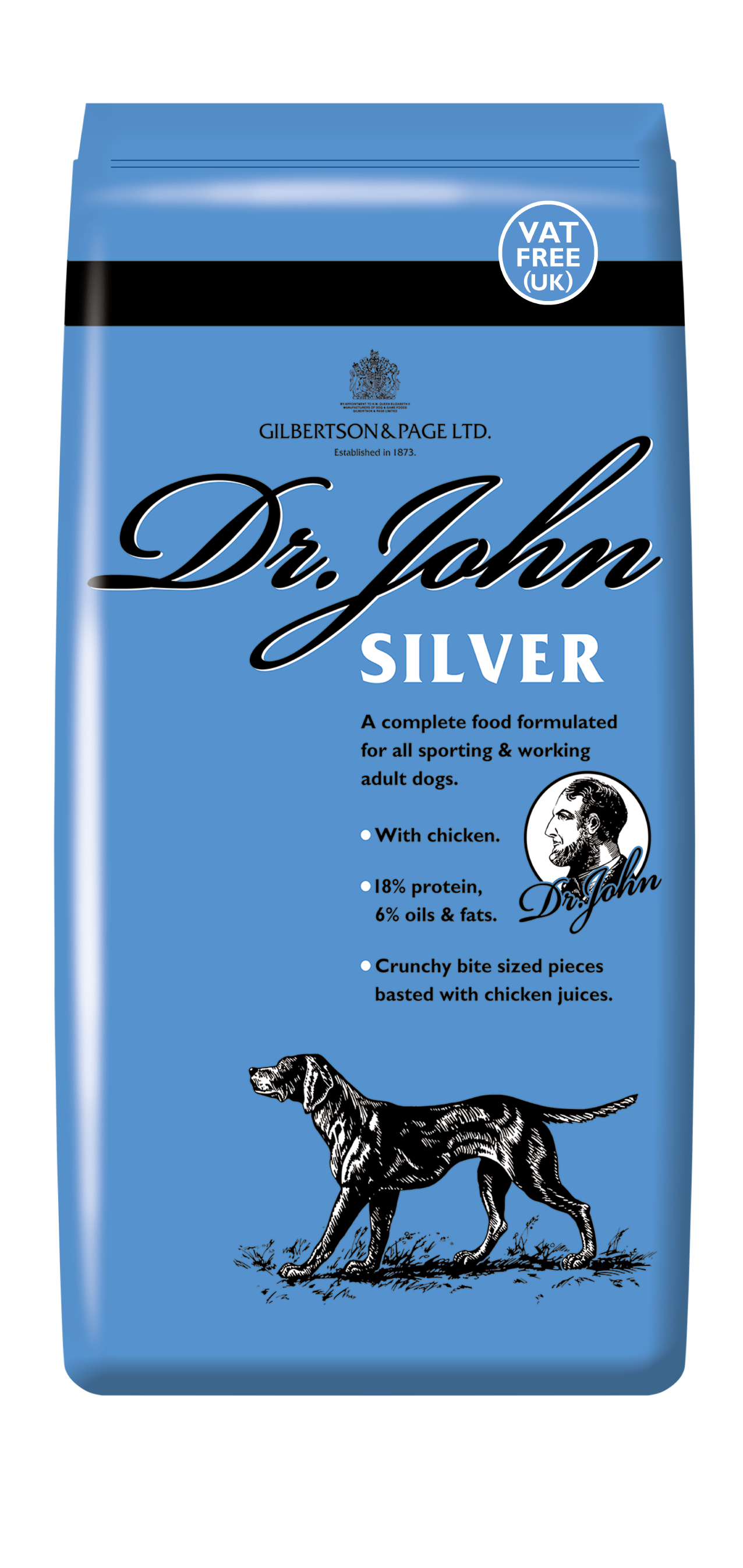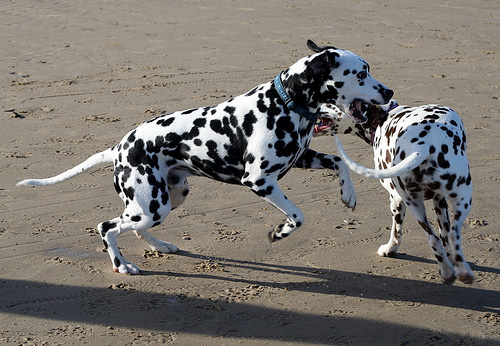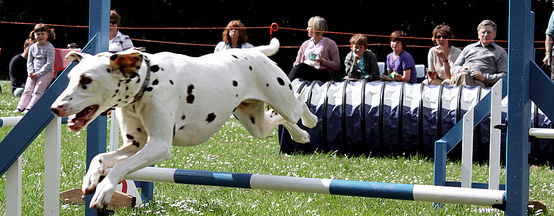Keeping your Dalmatian Healthy – A Look at Diet & Condition
27/01/2014
If you own one Dalmatian, or a dozen, we hope that this short guide proves useful. It’s the first of several breed-specific articles drafted by our highly-qualified canine nutritionist, Samantha Ware. Unfortunately, Samantha spends a lot of time in the lab, which is probably good for our customers’ dogs, but makes it hard for those of us who want to pass on her knowledge and enthusiasm!
Having said that, she does get out to quite a few events, offering specialist feeding and dietary advice. In fact, she was one of the ‘attractions’ at the Dally Rally in Wales’ Crychan Forest back in August.
Dalmatians are not easy to categorise because, although the breed exhibits some common traits, especially physiologically, there are wide variations in things like temperament. However, from the point-of-view of their general nutritional requirements, things are pretty straightforward:
Size
Dalmatians are a medium to large breed. What you feed them should be suitable for the mouth size and their physiological requirements, so a medium to large dog biscuit is ideal and, as an adult, a medium maintenance diet.
Activity Level
They can have high levels of activity, which means they may need joint protection depending on how this energy is spent. If they are sporting dogs, participating in agility or fly ball for instance, then they may need higher levels of nutrients and energy from the diet if speed is required, or slow releasing carbohydrates if stamina is required for activities like tracking or obedience trials.
Coats
Dalmatians have beautiful coats, which need to be maintained, so you want a good balance of omega 6 and 3’s. Unfortunately, they are also prone to skin allergies and, typically, you will start to see little bumps (hives) develop on their skin which irritate them. It’s worth knowing that 90% of skin allergies in dogs are due to airborne allergens and only 10% are due to food allergies. Typically, food allergies cause other symptoms like vomiting, diarrhoea, gas and sneezing. For airborne allergens, antihistamines from your vet are the best treatment, whilst food allergies need investigation into individual ingredients to isolate the causative factor.
Temperament
Dalmatians can vary a lot and be unpredictable. They can be strong natured dogs, not always easy to train to start with and in the worst cases, aggressive. The diet can help with this. Studies have shown that lower protein diets alongside supplemented omega 3’s can help reduce anxiety, hyperactivity and behavioural aggression, so whilst there is no substitute for training, the diet can play a role alongside.
Digestion
Dalmatians as a deep chested breed are unfortunately at risk of bloat also called gastric dilatation volvulus (or GDV). There are lots of theories about how bloat develops, one of the more recent, is that the stomach’s contractions lose their regular rhythm and trap air in the stomach which then causes a twisting event. Why this happens, isn’t really understood but a few measures have been shown to be effective in preventing it. Avoid ingestion of large quantities of water or food, feeding little and often is ideal, also avoid high fat diets as these increase risk, GDV is more likely to occur on a hot day than cold, so be more aware on these days, of the symptoms of GDV, because catching this early can lead to a more favourable outcome at the vets. So, just as a quick reminder of the symptoms of GDV: anxious behaviour, depression, abdominal pain and distention, collapse, excessive salivation, and vomiting to the point of unproductive dry heaving.
Urinary Stones
Like virtually every dog breed, Dalmatians have susceptibility to particular health conditions that often become defining factors for the breed. Probably the best-known of these is urinary stones (also known as Urates).
These are also called crystals when they are young immature stones. Dalmatians are the only breed of dog born with a defect in how they produce their urine. Uric acid which would normally be processed into allantoin, is left in an insoluble form which the Dalmatian then has to excrete in their urine and consequently develops into crystals and later stones. Typically male Dalmatians are more likely to suffer problems with urates, due to anatomical differences between the sexes.
The Dalmatian stones are a specific type of stone, an ammonium acid urate or purine urate that develop nearly exclusively in Dalmatians. Symptoms to watch out for:
- Blood in the urine
- Straining to urinate
In particularly bad cases, a complete obstruction can develop which can rupture the bladder, so it is important to try to act early.
If your Dalmatian is confirmed as having these stones, treatment typically is with an anti-urate drug combined with a prescription diet, but surgical removal is required in some cases.
Prevention
With Dalmatians, preventing urates is key, and there are a number of dietary interventions that can help prevent urate development:
- Make it a priority to keep your Dalmatian hydrated at all times as this helps to keep their urine dilute and easier to excrete. In extremis, some experts suggest using filtered or distilled water to keep excess minerals to a minimum.
- Try to keep your Dalmatians on a diet higher in pH i.e. more alkaline and aim for a urine pH of 6.5-7. This means restricting acidic ingredients like beef, pork, shellfish, eggs and maize gluten.
- Aim to keep their diet low in protein and purine content. It is important that Dalmatians have a maintenance level of protein in their diet, otherwise this can cause heart and liver problems but a restricted level of around 18% protein is ideal in a prevention diet. Restrict ingredients rich in purines such as meat proteins like beef, pork and sardines and also yeast. Oddly, the active ingredient in chocolate (threobromine) is also high in purine, providing another reason to not feed chocolate to dogs! Fruit, vegetables, cheese and potatoes are good ingredients but need to be balanced alongside the nutritional requirements of the dog, i.e. include some poultry or white fish and carbohydrate for energy and stamina.
The urinary stones problem is taken very seriously by the various national bodies and breed clubs. So much so that a very successful programme of breeding has been undertaken in Indiana to backcross Dalmatians with Pointers in the hope of breeding out the defective gene. To date, these Dalmatians haven’t been accepted by the AKC, but the UK Kennel Club has registered them. In addition, the British Dalmatian Club is hoping to discover a ‘wild-type’ genotype (Dalmatians without the defective gene) in an attempt to establish a pure bred version. This is principally because there are understandable concerns with the higher level of deafness found in American Dalmatians, and which is also present in these back-cross Dalmatians.
Dalmatian Diets in Summary
Diet is an important factor for the health and well-being of this breed and, furthermore, diet can be manipulated to assist and prevent both known defects within the breed and less common ones too. There are many appropriate options across complete foods, dry, tinned, home cooked and raw. Ultimately, an individual assessment of each dog’s requirements should be made to give him/her the best chance at a healthy life.
 Within the Gilbertson & Page family of feeds, the best option for Dalmatians is Dr John Silver. This complete food variety is formulated with a protein level of 18% and is low in purine-rich ingredients, with an oils and fats content of just 6%. Dr John Silver is also a good example of how a dog food that meets the rather specific needs of a particular breed needn’t be expensive.
Within the Gilbertson & Page family of feeds, the best option for Dalmatians is Dr John Silver. This complete food variety is formulated with a protein level of 18% and is low in purine-rich ingredients, with an oils and fats content of just 6%. Dr John Silver is also a good example of how a dog food that meets the rather specific needs of a particular breed needn’t be expensive.




